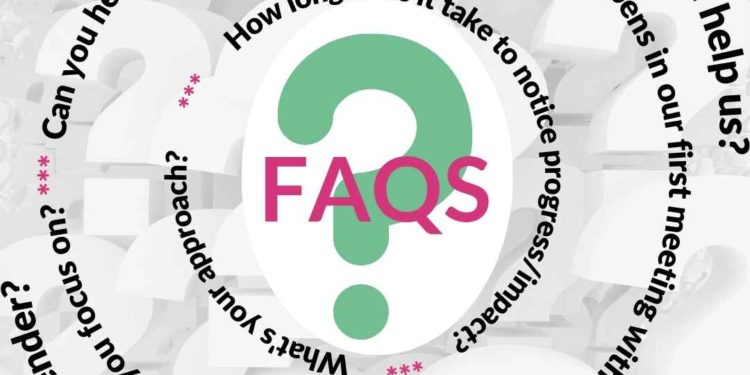We thought we’d dedicate one post to giving you a flavour for the most frequently asked questions we receive about our approach to working with you. You’ll find 9 of them below. Is yours on the list?
1. How can you help us?
If you want to bring about an EDI transformation in your organisation, then it’s highly likely that we can help you do that. Our aim is to identify where you are on the EDI journey and to help you progress to the next level and onwards. Using our customised assessment tools, we are able to pinpoint not only where you are on the EDI journey, but also identify the next steps that would be most impactful for you.
2. What happens in our first meeting with you?
In our first meeting, we ask a lot of questions that help us understand the drive for your EDI transformation and what would work best for your organisation. We also want to understand what challenges you are experiencing so we can help you prioritise. Having listened carefully, we then let you know how we can support you on your EDI journey and how we could work together.
3. What’s your approach?
Our consulting approach comprises 5 phases (see below).

Beyond consulting, we also offer:
- A Learning and Development series
- Awareness Raising and inspirational talks
- Various services supporting the implementation of EDI
4. Are you focused primarily on gender?
It is fair to say that our initial journey began with an emphasis on gender, and more specifically on women in the workplace. We very quickly learned, however, that in order to make a real difference, we need to address the culture rather than individual types of diversity within it. For this reason we no longer focus on any given diversity group. Instead, we focus on inclusion and, within it, inclusive behaviours. We help clients understand how to behave more inclusively, how they mightn’t be as inclusive as they think they are, and how to notice the obstacles that stand in the way of inclusion.
5. What types of companies do you work with and where?
Most of our clients are based in the UK and are organisations with 50 to 1,500 employees. That said, we have also been working successfully with global organisations based in the EMEA region (and even the US) that needed bespoke support in EDI. Many of these organisations have their own EDI managers whose remit may not fully cover the requisite need or whose strategic approach does not take regional differences into account. You can find out more about the types of clients and projects we’ve been working on here.
6. What is the difference between consulting and training in your world?
What we mean by consulting is working with you to identify how EDI will support your organisation’s business mission and vision. Consulting also means working with senior leaders to assess senior levels of commitment and their understanding of the EDI transition. We may also conduct one of our diagnostics as part of our consulting work, to identify where the organisation is at that time with regard to inclusion, relative to where it wants to be. We would then advise on the necessary steps to get there. Another critical part of our consulting is to help identify systemic bias and advise on how to address it. Examples of this include making the attraction and hiring processes more inclusive and ensuring a more inclusive progression and promotion process.
What we mean by training is offering sessions that equip people with skills that allow them to be more inclusive. We have a wide range of EDI-relating training topics, with some of the most popular being around inclusive behaviours, biases in the workplace, inclusive language and inclusive leadership.
7. How long does it take to notice progress?
Progress on a small scale can be noticed almost immediately after you’ve started working with us. A subtle shift in behaviours, in levels of awareness and the use of certain words can be seen relatively quickly. Changes with regard to certain targets can also be seen quite soon – within 2 or 3 cycles, sometimes even sooner. Cultural changes, however, take longer and can involve setbacks; these are sometimes due to changes in leadership and motivation, sometimes due to inconsistent messages and behaviours across the organisation, and sometimes due to external factors. Progress on a cultural scale isn’t linear yet one thing is certain: the sooner you embark on your EDI journey, the sooner you will notice the progress.
8. How do you measure success?
Success can be measured in many different ways. If our engagement with you is to help meet certain targets, success is measured quantitatively. If you want us to help expand the pool of diverse candidates and hires, this too can be measured quantitively.
Similarly, we show you the measure of successful change in behaviours through various (self- and other types of) assessments, through personal accounts and through levels of engagement which are often measured internally with engagement surveys.
9. Can you help with one specific query?
Yes, of course! You don’t need to engage us for the entire EDI journey. Our Expert on Tap sessions are designed to provide advice for specific challenges or questions, after which you may be able to address a more involved agenda. Equally, we’re happy to come in to run one workshop or training session on a specific topic, like Inclusive Communications or The Why What & How of Equity, Diversity and Inclusion.
However we help you, our aim is to partner with you for as long as you need us and to help you progress successfully without the need for further external intervention.


